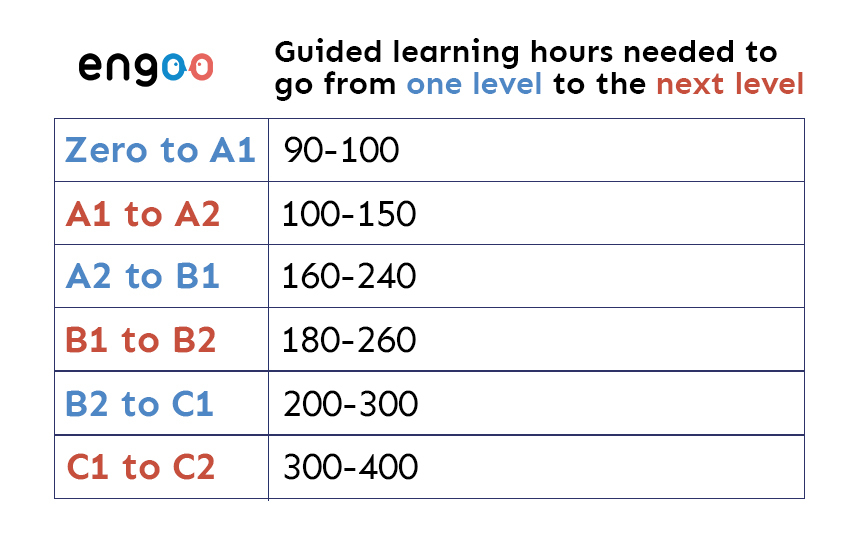Engoo
Republished on (Originally released on )
![Can I Learn English in One Month? [Updated] Can I Learn English in One Month? [Updated]](https://assets.blog.engoo.com/wp-content/uploads/sites/9/2021/06/31050206/one_month_english-1024x683.jpg)
Have you ever wondered how much time you’ll need to learn English? For example, would it be possible for you to master it in a month or by your next trip overseas? Research and experience can give us some answers!
A 2018 report by Cambridge University Press estimates that motivated adult learners who already know the English alphabet and have decent teachers and learning materials:
... typically need between 100 and 200 hours of guided learning to get from one CEFR level to the next. As you go up the levels, you need more hours to get to the next one.
“Guided learning” refers to the number of hours in class and doing homework. Here are their estimates of the number of hours of guided learning necessary to get from one level to the next:

So the answer to “Can I learn English in one month?” depends a lot on the level you’re aiming for. Assuming you’re currently at the level of A1:

The numbers above are helpful, but they don't tell the complete story. The Cambridge report actually mentions 11 more factors to consider. Here are a few we found especially important:
Are you learning by yourself or studying at a school? Are you learning in your home country or in an English-speaking country? These factors can have a big impact on how quickly you can pick up English.
If you’re learning with a teacher, do they focus more on grammar and accuracy or on communication and fluency? Do they give you feedback, help motivate you and answer your questions?
Do you take classes once a week or five times a week? How often do you study on your own and review? Studying just once in a while won't help you much, but you also don't want to overdo it.
You’ll be more motivated to learn a language if you think it’s interesting and helpful for your life. It also helps if you know others who’ve mastered English; people without these role models, or who have struggled to learn English before, will have a more difficult time.
Some languages are more similar than others. If your first language has a lot in common with English (such as Spanish or Portuguese, for example), it will be easier to improve than for native speakers of languages like Russian or Turkish, which don't have many English connections. This is especially true for learners at lower levels.
If you feel shy around native speakers or anxious speaking English in general, you will probably need more time to become fluent than someone who is naturally confident speaking English. But don’t worry! You can find your own path to mastery.
We hope this gives you an idea of how much time it will take you to reach your target English level. Just remember that there is no simple formula for finding the exact amount of time; how fast you improve depends on your goals, your level of motivation and many other factors.
So instead of searching for a magic number, it’s more helpful to find the study methods that work best for you. One way we can recommend is to study with a tutor, and Engoo has instructors around the world ready to help whenever it's convenient for your schedule. Give it a try!
